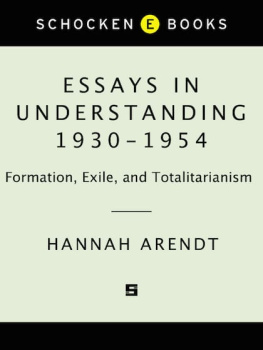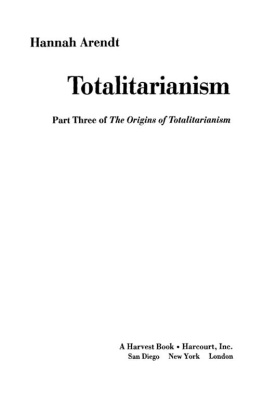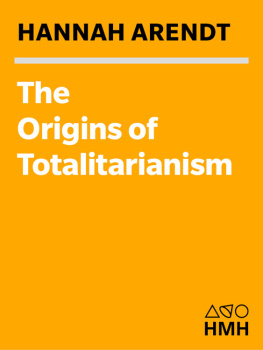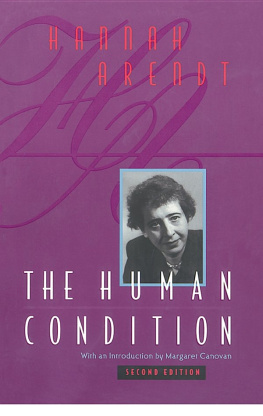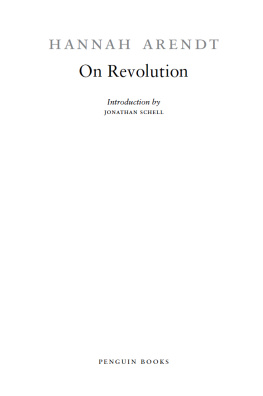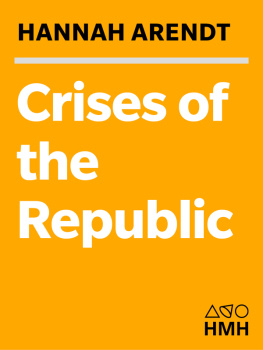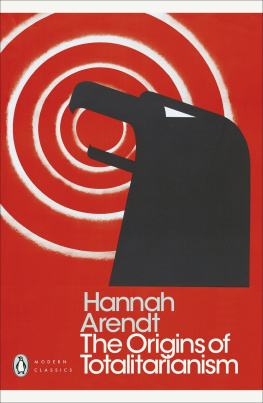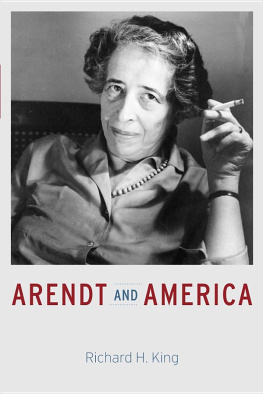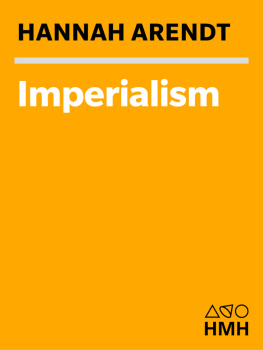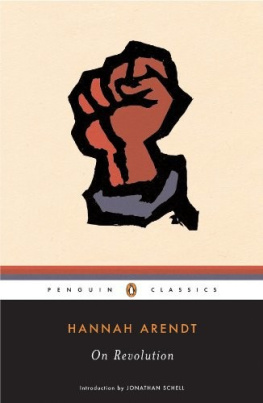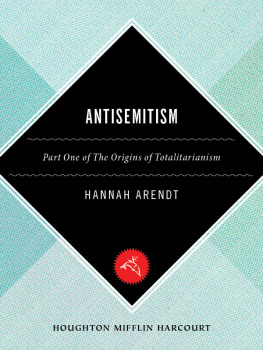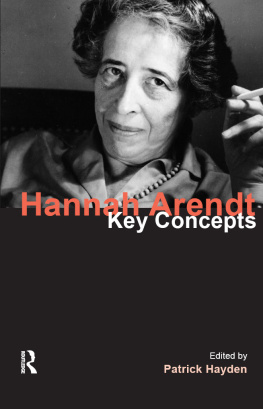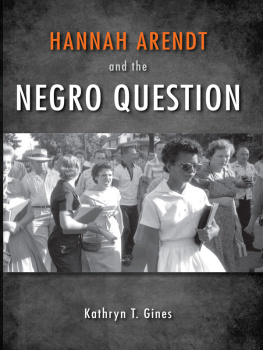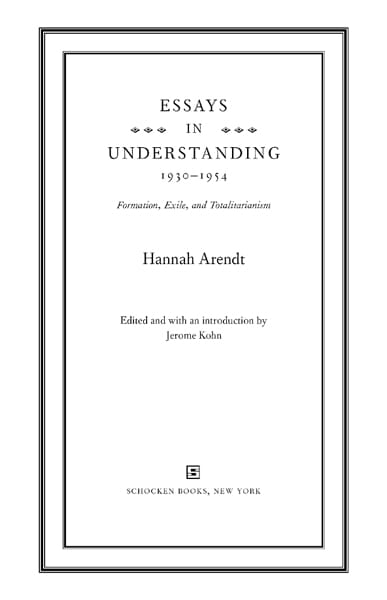BOOKS BY HANNA ARENDT
Nonfiction
Between Past and Future: Six Exercises in Political Thought
Crisis of the Republic
Eichmann in Jerusalem: A Report on the Banality of Evil
Essays in Understanding, 19301954
The Human Condition
The Jew as Pariah: Jewish Identity and Politics in the Modern Age
Lectures on Kants Political Philosophy
The Life of the Mind
Love and Saint Augustine
Men in Dark Times
On Revolution
On Violence
The Origins of Totalitarianism
The Promise of Politics
Rahel Varnhagen: The Life of a Jewish Woman
Responsibility and Judgment
Correspondence
Between Friends: The Correspondence of Hannah Arendt and Mary
McCarthy, 19491975
Correspondence, 19261969 (with Karl Jaspers)
Letters, 19251975 (with Martin Heidegger)
Within Four Walls: The Correspondence Between Hannah Arendt and
Heinrich Blcher, 19361968
Compilation, introduction, and editorial notes copyright 1994 by The Literary Trust of Hannah Arendt Bluecher
Copyright 1994 by the Literary Trust of Hannah Arendt Bluecher
Copyright 1954, 1953, 1950, 1946, 1945, 1944 by The Literary Trust of Hannah Arendt Bluecher
All rights reserved. Published in the United States by Schocken Books, a division of Random House, Inc., New York, and simultaneously in Canada by Random House of Canada Limited, Toronto. Originally published in hardcover by Harcourt Brace & Company, New York, in 1994.
Schocken and colophon are registered trademarks of Random House, Inc.
What Remains? The Language Remains: A Conversation with Gnter Gaus, English translation copyright 1994 by The Literary Trust of Hannah Arendt Bluecher. First published in Was bleibt? Es bleibt die Muttersprache by Deutscher Taschenbuch Verlag, Munich. Copyright 1965 by Gnter Gauss, Rienbeck. Augustine and Protestantism previously appeared as Augustin und der Protestantismus in Frankfurter Zeitung, no. 902 (4 December 1930). Philosophy and Sociology previously appeared as Philosophie und Soziologie: Anlsslich Karl Mannheim, Ideologie und Utopie in Die Gesellschaft, 7, no. 2 (Berlin, 1930), pp. 163-76. Sren Kierkegaard previously in Frankfurter Zeitung, no. 75-79 (29 January 1932), p.2. Friedrich von Gentz previously appeared as Friedrich von Gentz: zu seinem 100 (Todestag am 9 Juni) in Klnische Zeitung, no. 308 (8 June 1932). Berlin Salon previously appeared as Berliner Salon in Deutscher Almanach fr das Jahr 1932 (Leipzig, 1932). Copyright 1932, 1930 by The Literary Trust of Hannah Arendt Bluecher. English translation copyright 1994 by The Literary Trust of Hannah Arendt Bluecher. On the Emancipation of Women previously appeared as Das Frauenproblem der Gegenwart in Die Gesellschaft, 2 (Berlin, 1933), pp. 177-79. Copyright 1933 by The Literary Trust of Hannah Arendt Bluecher. English translation copyright 1994 by The Literary Trust of Hannah Arendt Bluecher.
A War from The Complete Poems by Randall Jarrell. Copyright 1951 and copyright renewed 1979 by Mrs. Randall Jarrell. Reprinted by permission of Farrar, Straus & Giroux, Inc., and Faber and Faber Ltd.
Library of Congress Cataloging-in-Publication Data
Arendt, Hannah.
Essays in understanding: 1930-1954 / Hannah Arendt; edited by Jerome Kohn.
p. cm.
Originally published: 1st ed. New York: Harcourt, Brace & Co. 1994.
eISBN: 978-0-307-78703-3
1. Philosophy. 2. Political science-Philosophy. 3. Literature, Modern-20th century-History and criticism. I. Kohn, Jerome. II. Title.
B945.A691 2005
100-dc20 2004059004
www.schocken.com
v3.1
Contents
Introduction
What is important for me is to understand.
For me, writing is a matter of seeking this
understanding, part of the process of understanding.
What Remains? The Language Remains
I T IS A curse to live in interesting times. So runs an ancient Chinese saying that Hannah Arendt, during the last eight years of her too short life, would cite as an aside in the midst of discussing the latest domestic disaster or international crisis. She did so wryly or pensively, as if its ironic meaning were transparently clear, neither requiring nor receiving any explanation. Nevertheless, it was difficult not to be struck by something paradoxical, not only in the saying itself but in hearing it from her, for her commitment to human affairs was uncompromisingly serious. She sought to understand the events of this terrible century with a passion that for many years has inspired scholars, artists, writers, intellectuals, public figures, and many others who read her work to confront unsentimentally, and without equivocation, the sufferings of this none too beautiful world, even in the darkest of times. The quoted words are hers, and it is on account of them that today, in retrospect, the Chinese proverb appears strangely evocative and even emblematic of this intensely thoughtful and private woman.
Hannah Arendt (19061975) is known throughout much of the world as a political philosopher, in spite of the fact that, for the most part, she repudiated that title, along with the claims and foundations of political philosophy. It is difficult to say what she was. Whereas some commentators have emphasized the sociological and historical aspects of her work, and others its literary and indeed poetic quality, still more have written of her as a political scientist (a label she applied to herself for many years). Later, when fame had come to her and she was asked to describe what she did, she reluctantly, but commodiously referred to it as political theory or thought. She has been hailed, justifiably, as both a liberal wanting change and a conservative desiring stability, and been criticized for harboring an unrealistic yearning for the past or for being a utopian revolutionary. These various characterizations (and far more subtle ones might be adduced) reflect the diverse interests of those who make them, yet they also indicate the genuine perplexity encountered by any impartial reader who attempts to form a judgment of Arendt in terms of traditional academic disciplines or traditional political categories. It may be disconcerting to realize that by nature Arendt was not personally attracted to the political realm, not initially and perhaps not ever: even her striking and mature understanding of political action was due, she said, to the fact that she looked at it from the outside.
What is beyond doubt, however, is that from first to last she was irresistibly drawn to the activity of understanding, an endless and circular mental activity whose principal significance for her lay in itself rather than in its results. She had plenty of ideas and opinions, to be sure; she made new distinctions, contributed new concepts, and altered old categories of traditional political thought. Those are results, and they have proved to be useful ones. But, although it is unexpected to find a political thinker who is not primarily concerned with solving problems, Arendts ceaseless ventures in understanding were for her no more instrumental than life itself. What is more difficult to grasp is that the activity of understanding afforded her a measure of reconciliation to the world in which she lived. If others came to understand, in her sense of understanding, then she was gratified and made to feel at home. This does not mean she wanted or thought it possible to hand over her own understanding to anyone else. That would have been sheer nonsense to Arendt, for whom thinkingunderstanding, endowing an event with meaningwas an engagement with oneself, solitary and private. She led an exemplary life, a life that has been told and will be retold, but ultimately the light shed on the world by her understanding of it is the only way to catch a glimpse of

